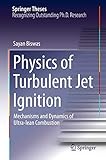Physics of Turbulent Jet Ignition [electronic resource] : Mechanisms and Dynamics of Ultra-lean Combustion / by Sayan Biswas.
By: Biswas, Sayan [author.] .
.
Contributor(s): SpringerLink (Online service) .
.
Material type:  BookSeries: Springer Theses, Recognizing Outstanding Ph.D. Research: Publisher: Cham : Springer International Publishing : Imprint: Springer, 2018Edition: 1st ed. 2018.Description: XVIII, 216 p. 131 illus., 108 illus. in color. online resource.Content type: text Media type: computer Carrier type: online resourceISBN: 9783319762432.Subject(s): Aerospace engineering
BookSeries: Springer Theses, Recognizing Outstanding Ph.D. Research: Publisher: Cham : Springer International Publishing : Imprint: Springer, 2018Edition: 1st ed. 2018.Description: XVIII, 216 p. 131 illus., 108 illus. in color. online resource.Content type: text Media type: computer Carrier type: online resourceISBN: 9783319762432.Subject(s): Aerospace engineeringIntroduction -- Ignition Mechanisms -- Schlieren Image Velocimetry (SIV) -- Supersonic Jet Ignition -- Combustion Instability at Lean Limit -- Ignition by multiple turbulent jets -- Impinging Jet Ignition -- Flame Propagation in Microchannels -- Summary and outlook -- Appendix -- Conclusion.
This book focuses on developing strategies for ultra-lean combustion of natural gas and hydrogen, and contributes to the research on extending the lean flammability limit of hydrogen and air using a hot supersonic jet. The author addresses experimental methods, data analysis techniques, and results throughout each chapter and: Explains the fundamental mechanisms behind turbulent hot jet ignition using non-dimensional analysis Explores ignition characteristics by impinging hot jet and multiple jets in relation to better controllability and lean combustion Explores how different instability modes interact with the acoustic modes of the combustion chamber. This book provides a potential answer to some of the issues that arise from lean engine operation, such as poor ignition, engine misfire, cycle-to-cycle variability, combustion instability, reduction in efficiency, and an increase in unburned hydrocarbon emissions. This thesis was submitted to and approved by Purdue University.


There are no comments for this item.